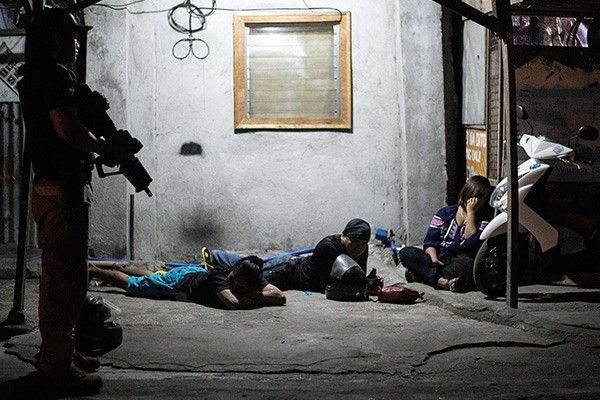Admission of police breaches in 'drug war' met with cautious optimism

MANILA, Philippines — Rights groups had mixed reactions to the disclosure of Justice Secretary Menardo Guevarra at the 46th Regular Session of the Human Rights Council Wednesday, welcoming it with cautious optimism while highlighting the urgent need for further action and transparency on the part of Philippine authorities.
The Commission on Human Rights said it welcomes the admission and that it appreciates updates that the investigation promised last year was partially complied with.
In a statement Thursday, the commission reiterated previous statements urging dialogue with the Philippine government "as we have consistently attempted to invite them to work with us."
To recall, Guevarra at the session admitted that according to initial findings of a review led by his department, personnel of the national police did not follow procedure on validating whether "drug personalities" killed while supposedly violently resisting arrest really did so.
READ: PNP failed to follow protocols in many drug operations, Guevarra tells UN rights body
The commission called the review "a step in the right direction."
"We emphasize, however, that we remain in anticipation of the full report of the review panel and look forward to be included in its processes. The investigations have to push through, and make sure that perpetrators are held to account. The victims need to be confident that actions will be taken, and we commit ourselves in making this a reality," the commission also said.
International rights groups hit 'empty claims' by DOJ
Global human rights coalition International Coalition for Human Rights in the Philippines said in a separate statement on Thursday that “the reality is impunity and escalating human rights abuses, a determined affront to the efforts of the UN Human Rights Council and the whole international community.”
The group pointed out that no less than the president himself "emboldens and issues policy statements for state authorities to commit human rights violations." At a speech last December, President Duterte said police should shoot first, and worry about human rights later.
“The reassuring diplomatic tone of Philippine Justice Secretary Guevarra’s message to the UN Human Rights Council yesterday cannot hide the raw truth that so far there has been no accountability for the murder of tens of thousands of civilians by police and the armed forces in the government’s war on drugs and counterinsurgency program,” said ICHRP spokesperson Peter Murphy.
“All we have from Secretary Guevarra’s statement is news of an unpublished internal review of some of the drug war killings, a claim that administrative and criminal actions are being taken against some police officers, and promises that a technical cooperation program on human rights with the UN agencies will be announced some time soon,” Murphy also said.
Both local and international organizations have said that the nightly killings only increased amid the coronavirus-induced lockdowns, a claim corroborated by the government's own data.
Rights groups both here and abroad say the death toll of the anti-drug campaign may be as high as 30,000 deaths since Duterte's "war" began in 2016.
In November, then-PNP chief Camilo Cascolan — who has since been given a post as an undersecretary in the Office of the President — acknowledged that almost 8,000 "drug personalities" had been slain in official operations, where cops routinely claim that only suspects who fought back were killed.
However, the latest data from the administration's Real Numbers PH campaign dialed this back to just 6,039 "persons who died during anti-drug operations."
Real Numbers PH, the administration's information campaign for the "war on drugs", aggregates data from a number of agencies including the Philippine National Police, the Philippine Drug Enforcement Agency, and the Dangerous Drugs Board.
'PH gov't excels at telling int'l community what it wants to hear'
For its part, the New York-based Human Rights Watch called into question the sincerity of the justice chief's pronouncements, pointing out that the lack of investigations into killings at the start of the administration's term is precisely what gave rise to more killings later on.
"At best, the Justice Secretary’s statement at the Human Rights Council shows both the DOJ and senior police were asleep at the switch as the 'drug war' killings accelerated and intensified. He is now revealing a reality that was obvious to those in the affected communities, namely that after killings occurred, there were no subsequent police investigations into the circumstances of what took place," Phil Robertson, deputy Asia director at Human Rights Watch said in a statement.
"The real name for that is impunity, and these police failures were so systematic that these oversights go well past the accidental or inadvertent failures. The truth is the Philippines National Police were operationalized to act as a government hit squad against suspects on lists in the 'drug war,' and they received direct encouragement to do so from President Duterte on down to their local commanders," he also said.
Human Rights Watch also called for transparency moving forward, urging the justice department to make good on its pledges and ensure that its recommendations are fully implemented.
"Transparency is essential, so all the records of the Philippines police’s internal investigations to these killings should immediately be made public, along with clear descriptions of any punitive measures imposed on the officers involved. Member states of the HRC should monitor this situation closely to make sure these promises do not turn out to just be more window-dressing," Robertson also said.
"No one should forget that the Philippines government excels at telling the international community what it wants to hear in international meetings like this one, only to forget the pledges and the promised follow-up as soon as their officials arrive back home."
- Latest
- Trending


































